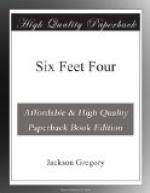With scant time allowed in their plans to waste on such as Blackie he was made to lie down in the bottom of the wagon, his wrists bound, his wound very rudely bandaged, his body screened from any chance view by the boxes and mail bags and a handkerchief jammed into his mouth. Within ten minutes Hap Smith was clattering on, his and the guard’s mouths and eyes grim and hard, and Thornton had again dropped behind, just out of sight around the first bend in the road.
“And now, my boy,” muttered Hap Smith to his friend the guard, “keep both eyes peeled and your trigger-finger free. Hell’s goin’ to pop in considerable less’n no time.”
Nor was the stage driver unduly pessimistic. Half an hour after Blackie had gone down among boxes and bags the lumbering vehicle thundered into one of the many deep gorges through which the narrow road wound. Here was a sharp turn and a bit of steep grade to take on the run if the stage were to keep to schedule time. But suddenly and with a curse from Smith and a sharp exclamation from the guard, Hap slammed on his brake. A newly fallen pine tree, three feet thick, lay across the road.
The guard’s rifle was ready in his hands; in a flash Hap Smith had dropped his reins so that they were held only by the ring caught over the little hook at the back of the seat and had whipped out his own big ugly revolver. His eyes ran this way and that; in his soul he knew well enough that no mere bit of chance had thrown the obstruction across his way. But never a head nor an arm nor a rifle barrel rewarded his look. Until, suddenly, heralded by a curt shouted command, a man rode out into the open road from the mouth of a canon.
“Don’t be a fool, Smith! Take a little look-around first!”
It was a voice eminently cool and steady and insolent. Though his gun rose slowly Hap Smith heeded the note of arrogance and, with a hard finger crooking to the trigger, looked about him again. And this time not in vain. Yonder, from across the top of a boulder, a rifle barrel bore unwaveringly upon the breadth of his chest; ten feet higher up on the mountainside where there was a pile of granite rocks and a handful of scrub brush, a second rifle gave its sinister silent warning; two other guns looked forth from the other side of the road ... in all, at least five armed men....
Hap Smith’s eyes went back to the man sitting his horse in the middle of the road, just across the fallen pine tree. A tall, powerfully built man dressed quite as Hap Smith and the guard had been told to expect: black, shaggy chaps, grey shirt and neck-handkerchief; broad black hat; red bandana across his face with wide slits for the eyes. And yet both of the men in the stage stared and were on the verge of uncertainty; had they not been prepared both would have sworn that it was Buck Thornton on Buck Thornton’s horse; and later they would, no doubt, have sworn to Buck Thornton’s saddle.




